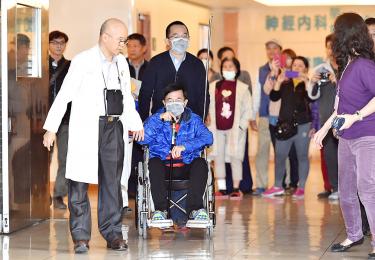Former president Chen Shui-bian’s (陳水扁) lawyers yesterday confirmed that he has been summoned to appear at the High Court on May 13, as the court reopens a trial into corruption charges against Chen over alleged misuse of the state affairs fund.
The news was revealed by Democratic Progressive Party (DPP) Legislator Tsai Yi-yu (蔡易餘), who claimed that President Ma Ying-jeou (馬英九) was behind the court’s decision to summon Chen.
The move comes at “a sensitive time when there are renewed calls by some in the pan-green camp for the former president to be pardoned,” Tsai wrote on Facebook. “The instruction came from the petty, narrow-minded Ma.”
“They had to schedule this hearing for just before May 20,” he added, referring to the date when Ma’s presidential term expires and president-elect Tsai Ing-wen (蔡英文) assumes office.
“Has the Ministry of Justice done anything useful? What they are good at is bullying Chen,” Tsai Yi-yu wrote.
Chen’s attorney Cheng Wen-lung (鄭文龍) confirmed that the summons had been received at Chen’s residence on Friday evening.
The summons requires Chen to appear at the High Court in Taipei on May 13 9:30am, Cheng said.
“This is quite strange. For the four major court cases involving Chen, judicial proceedings have been shelved for the past one or two years. Why did they reopen the trial at this time?” Cheng asked.
The High Court summons concerns allegations concerning Chen’s discretionary use of a state affairs fund during his eight-year term as president, Cheng said, for which Chen was found guilty and given a life sentence in the court’s first ruling.
The verdict was overturned in the second ruling and Chen was found not guilty, Cheng said, adding that on appeal to the Supreme Court, the case was sent back for retrial.
“The cases against Chen all seem to be politically motivated. Suddenly at this time, they reopen the trial, so people are bound to think there is a political reason,” Cheng said.
“I do not believe Chen is physically well enough to appear in court, but we have to check with his family to verify whether they have received the court’s notification and let them make the decision,” Cheng added.
Chen was released from prison on medical parole on Jan. 5 last year, after serving six years for a graft conviction related to his presidency.
After his second term ended in 2008, Chen was sentenced to life in prison in 2009 for money laundering and bribery — a term reduced to 20 years after appeals.
He began serving his sentence on Nov. 11, 2010, but had been detained for about two years by then, while prosecutors were investigating and prosecuting the cases.
Chen said the charges against him are part of a political vendetta by the current Chinese Nationalist Party (KMT) government in retaliation for his eight years in power promoting Taiwanese independence.
Over the past week, the Kaohsiung City Council and Tainan City Council passed motions urging Ma to grant a pardon to Chen before May 20, which they said could facilitate rapprochement between the pan-blue and pan-green camps.
However, the Presidential Office on Friday issued a statement rejecting the call, saying that there are still ongoing criminal cases involving Chen.
Separately yesterday, in response to media queries over whether he would call on president-elect Tsai Ing-wen to pardon Chen should Ma refuse to back down on his stance, Taipei Mayor Ko Wen-je (柯文哲) said the issue would best be resolved before the presidential handover.
“With GDP forecast to head into negative growth this year, people are panicking. I am afraid that Tsai will have more pressing matters to attend to,” Ko said.
Ko, who is set to visit Shoushan Zoo in Kaohsiung today, said he would probably also vist Chen, who is living in the city.
“It is only natural for me to pay him a visit. I am the convener of his medical counseling team,” Ko said.
Additional reporting by Sean Lin and staff writer
Source: Taipei Times - 2016/04/10





















